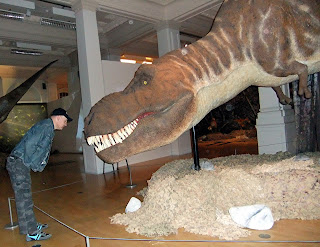With E.T. – how could I not take pity
on this errant extraterrestrial and bring him back home with me?
In any case, he must be happy here – he hasn't phoned home once, which is just
as well, bearing in mind the cost of intergalactic telephone calls these days! (© Dr
Karl Shuker)
Over the years, I've found myself sharing space in
photographs – selfies, as they'd be called nowadays – with some exceedingly
strange entities (and those are just my friends!). But seriously, browsing
through my albums recently I came upon a considerable number featuring me alongside
some truly weird – but indisputably wonderful – wildlife. So here, as one of my
more light-hearted ShukerNature contributions, and the first of an occasional
series, is a dozen of my most memorable crypto-selfies, annotated with a bountiful
abundance of decidedly (ir)relevant information…
Alongside a black cheetah statue at Colchester
Zoo, in Essex, England, which I visited in 2013; as noted in my books Mystery Cats of the World and Cats of Magic, Mythology, and Mystery, a
few records of all-black (melanistic) cheetahs are indeed on file, including a
specimen spied in the company of a normal cheetah by Lesley D.E.F.
Vesey-Fitzgerald in Zambia during the first half of the 20th
Century, and another one sighted in Kenya's Trans-Nzoia District by H.F.
Stoneham in 1925 (© Dr Karl Shuker)
With one of the famous 19th-Century
dinosaur statues at Crystal Palace Park in Bromley, London, which I visited in
2009; created by famous sculptor Benjamin Waterhouse Hawkins (1807-1894) and
totally outdated now, this one is meant to be a Megalosaurus, but its
reconstruction was guided by the popular yet erroneous belief current at that
time that dinosaurs resembled giant lizards (© Dr Karl Shuker)
Holding a Brazilian were-pig skull –
hailing from Rio de Janeiro, this is the skull of a wild boar
that has been intricately decorated to resemble the supposed appearance of a Brazilian
were-pig's head (© Dr Karl Shuker)
At Drayton Manor Park and Zoo, in Staffordshire, England, standing somewhat warily alongside a disconcertingly life-like, life-sized replica of North America's late Pliocene/early Pleistocene terror
bird Titanis walleri, which may have stood up to 8 ft tall – check out my book The Menagerie of Marvels for an extensive chapter documenting
the history of these flightless but fleet-footed and sometimes truly gargantuan
carnivorous birds (© Dr Karl Shuker)
With an acklay – when I purchased this
model at a market a few years ago, I had no idea what the creature was
that it represented, but thanks to some knowledgeable sci-fi enthusiast friends
on Facebook I soon learnt that it was an acklay, a huge non-sentient carnivore
up to 11.5 ft tall, hailing from the planet Vendaxa
in the Star Wars canon's universe (© Dr Karl Shuker)
Alongside a life-sized animatronic
model of the feathered dinosaur Citipati at Bristol Zoo, England, in
2013; an oviraptorid theropod from Mongolia's Late Cretaceous period, Citipati
was named after a pair of murdered meditating monks from Tibetan Buddhist
folklore, it possessed a large toothless beak, and it stood as large as a present-day
emu; in this particular reconstruction, it looks decidedly cassowary-like (© Dr
Karl Shuker)
There I was, minding my own business
walking round the small West Midlands, England, town of Cradley Heath, when, happening
to step inside a sci-fi/comic shop, who should I encounter there but the
Predator! I can only assume that my trusty leather biker jacket helped to
conceal me from its thermal imaging capability long enough for me to get this
photo snapped of me alongside it; if you're wondering why the photo is a little
blurry, it's because the (ex) person taking it for me suddenly realised that unlike
me he wasn't wearing anything to cloak his thermal image – I won't tell you
what happened to him next, as I don't want to give you nightmares – suffice it
to say that at least it kept the Predator occupied long enough for me to make
my excuses and exit stage right! (© Dr Karl Shuker)
Face to face with a life-sized Tyrannosaurus
rex model at a dedicated T. rex exhibition held at Birmingham Museum
& Art Gallery in the West Midlands, England, during 2010 – it's not often
that you get the chance to stare down a T. rex, although in this particular
instance the only thing that I seemed to be staring down was its nostrils; Jurassic
Park claimed that as long as you stood perfectly still, a T. rex
would be unable to detect you, so what better time to put this claim to the
test?? © Dr Karl Shuker)
Holding a cast of a 16-inch-long bigfoot (sasquatch)
footprint discovered at Grays Harbor, in Washington State, USA, during 1982; I purchased this
particular cast from veteran bigfoot researcher Prof. Grover Krantz during the early 1990s
(© Dr Karl Shuker)
Sharing some quality time with a
life-sized Moeritherium statue at London's Natural History Museum in
2014; this was a very early genus of proboscidean living during the Eocene
epoch 37-35 million years ago in northern and western Africa, but dying out
without giving rise to any modern-day elephant lineage; initially I was very
puzzled that this statue's trunk seemed to have been rubbed so vigorously that
much of its surface had lost its colour – why would this have happened? Then Facebook
friend Adam Naworal reminded me that it was traditional to rub elephant statues
for good luck, so that may well explain the otherwise anomalous case of the mutilated
Moeritherium; fortunately, however, this doesn't seem to have traumatised
him, as he seemed happy enough to be with me (© Dr Karl Shuker)
Alongside Singapore's iconic merlion fountain-statue in
2005; the merlion is a legendary lion-headed fish known worldwide as a
symbol of Singapore,
and it is epitomised by this magnificent 28-ft-tall statue created by sculptor
Lim Nang Seng during 1971-1972, and relocated in 2002 to a promontory in Singapore's Merlion Park
(© Dr Karl Shuker)
I hope that
you've enjoyed this inaugural meander through my collection of crypto-selfies. Look
out for further selections in future ShukerNature posts!































